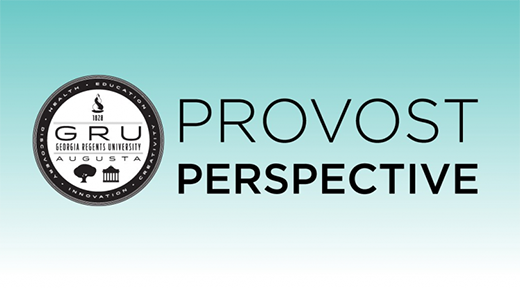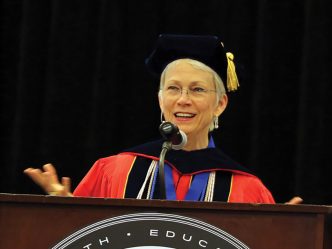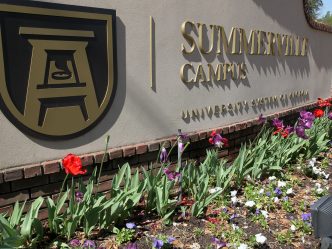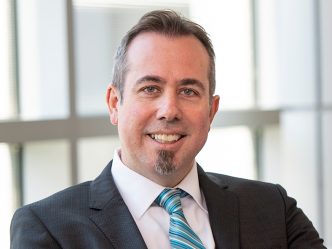If 2015 was a year of change – perhaps the biggest in the change-filled years since consolidation – then 2016 could very well be a year of establishing solid foundations, and nothing establishes a foundation quite like the accreditation process.
The Southern Association of Colleges and Schools Commission on Colleges, often shortened to the slightly more manageable SACSCOC, is the accrediting body that affirms Augusta University’s quality as a higher education institution, and every 10 years they put institutions through a rigorous evaluation process that, if successful, culminates in their seal of approval. This necessary and very important process has two components. Not only must a school demonstrate compliance with a set of defined standards, but it must also provide a Quality Enhancement Plan (QEP), which is basically a proposal to enhance student learning in a specific, measurable way.
This year will mark our first accreditation as a consolidated university and, consequently, the first time our QEP has been evaluated.
SACS gives institutions a lot of latitude in terms of the form the QEP can take, but we have to be able to demonstrate that we have the resources to launch the initiative as well as the ability to measure and analyze the results.
In other words, we need to develop a good idea that we can both effectively execute and accurately measure.
Obviously, coming up with such a comprehensive plan requires a great deal of effort, and several groups have worked tirelessly to make sure we are moving in the right direction.
Phase one of our QEP effort, which ran from February 2014 to the beginning of last year, involved determining what data existed specific to the university that could demonstrate what our particular needs were and how successful we were as a school at meeting them.
While that might seem like a basic step, it’s not really as easy as it might appear. The consolidation of a mostly undergraduate liberal arts university with a mostly graduate-level health sciences university provided several specific challenges, but once the needs were identified, we were able to compile a list of themes. From there, two particularly interesting proposals were chosen, then combined into one, which focused on providing students with experiential learning opportunities to prepare them as leaders in their fields.
Though this is the first QEP we’re submitting to SACS as a consolidated university, many on both campuses have experienced the process before.
Healthy Perspectives, an initiative out of the Office of Diversity and Inclusion, was the Quality Enhancement Plan being worked on by Georgia Health Sciences University at the time of consolidation, and although the timing of the consolidation process kept us from being required to implement the plan (consolidation triggered the need for a comprehensive, combined QEP) we chose to do it anyway. Augusta State was about a year behind GHSU in its accreditation cycle, and though the QEP program it was developing was also implemented, it was phased out after about a year and a half.
Neither of the previous QEPs were eligible to be used in this round because SACS requires a QEP to be an original plan.
This year’s plan is built around a foundation course, LDRS 2000, available to all undergraduate students that will provide an underpinning of basic leadership principals with assignments that integrate experiential learning while planning ahead for pursuing the Leadership Certificate. From there, interested students will have the opportunity to take courses in their majors that apply key QEP learning outcomes. They will be required to either take two of these courses or one course along with completing 150 hours of a documented leadership experience, such as holding a leadership position in a student organization.
While students aren’t required to continue through the different courses – the classes stand alone – those who do and who complete a very hands-on capstone project involving undergraduate research, study away, internship or another form of experiential learning will earn a certificate in leadership that will become a part of their official transcript and can be noted on their resume, something we feel will add value beyond the experience itself.
By structuring the program this way, we allow students not necessarily in the QEP stream initially the chance to become exposed to these classes in the course of their major studies, after which they might feel motivated to pursue the certificate from the middle.
We also realize that adding something new like this can be a burden to faculty, so we’ve worked hard to make sure the program can be implemented as smoothly as possible. Faculty teaching the major-related courses or mentoring leadership experiences and capstones will undergo training on the use of teaching techniques that involve experiential learning and on assessing student learning related to the QEP student learning outcomes. Additionally, funding has been set aside to support faculty wishing to introduce innovative teaching methods that involve experiential learning and who may need some financial assistance to cover supplies and equipment.
This program has already been approved at the university level, which means it’s something we could institute at any time, but to qualify as our QEP, we will have to present it in a written form and then communicate with our SACSCOC on-site reviewers, who will be vising in March. This team, which will include a consultant knowledgeable on aspects unique to our QEP, will evaluate and provide feedback on how we can strengthen the plan and ensure it successfully enhances student learning. With the benefit of the consultant’s insights, we will move forward with implementing this plan in anticipation of reporting its impact to the SACSCOC in five years.
My intention is that the plan becomes a cornerstone of our undergraduate curriculum, because while it may originate from the need to satisfy a requirement, I truly believe this plan will make a significant impact on how our students learn and how they are prepared for their endeavors after they graduate.
 Augusta University
Augusta University




